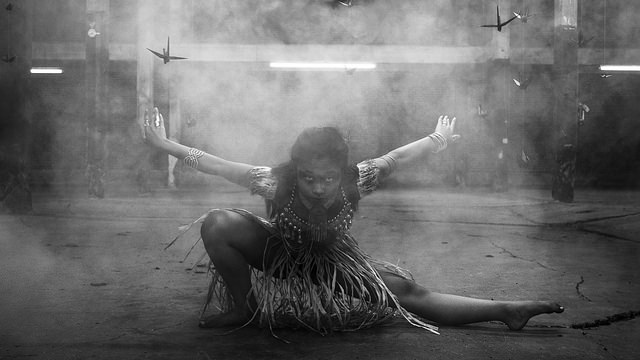My Journey through Anger: From Repression to Healthy Integration.
I was a good girl. The kind of girl who played nice, kept the peace, always wore an eager smile, and never dared to rock the boat.
I didn’t know that a growing anger was festering right beneath the surface of this good girl persona.
Creating a healthy relationship with anger starts with seeing the ways we avoid confrontation—how we collapse our own boundaries for the sake of connection, approval and love. Integrating our anger begins with embracing this powerful emotion as a trusty ally and protector of that which we hold most sacred.
But I couldn’t see my anger. I didn’t want a relationship with this terrible, no good, very bad emotion.
My Inner Good Girl was Born.
Growing up, my dad’s anger really frightened me. For example, if I left the cereal cupboard open in the kitchen, he might explode with curses and yelling (he has softened tremendously over the years). Often, my mother would swoop in, ready to calm him and fix the situation. Thus, I formed the belief that all anger was ugly, scary and bad. In addition, I adopted an identity similar to my mom’s—caring for others, putting on a sweet smile and doing whatever I could to earn those gold stars.
As a young adult, I further solidified my good girl persona when I began a spiritual practice in which I learned to control my emotions and rise above “negative” feelings into higher states of consciousness. But something wasn’t quite right. I felt more spiritually aware, but less connected to myself and my body. Over the years, people told me they adored me, but they had trouble connecting with me and thought I was kinda fake.
My Good Girl Began to Crumble.
This all came to a head in a relationship with my now ex-boyfriend. I fell madly in love with a man whom I judged to be wise, loving and self-assured. I completely lost myself in the relationship. Every day I chose to value his desires over my own, overriding my inner knowing in favor of his approval.
A dark and twisted anger began to grow within me. Yes, I was angry at him, but I was mostly furious with myself. I was losing myself for the perceived experience of approval and connection with another. By the time I had the courage to leave the relationship, I was a mess.
I had finally created something big enough to help me see that I had been lying to myself my whole life—essentially hiding myself from myself. It was like someone finally turned on the lights and illuminated the fact that my commitment to pleasing others was far larger than my commitment to being authentically me.
Why Being a Gold-Star Earning Good Girl or Boy Doesn’t Work.
We are liars. Yep, I said it. We suppress “bad” or “negative” emotions, thoughts and feelings in favor of everything “good,” as if we can block out half the spectrum of human experience and emotion. But anger is an essential part of what makes us human. It is our inner protector, powerfully exposing when a boundary has been crossed, and supporting us in accessing our full-body “no” and wholehearted “yes.”
Having a clear channel to our innermost feelings grounds us, and from there we can consciously choose how to respond to life. Yet, when we strategically tuck our emotions away, we lose the choice to respond to life from the fullness of our being.
In addition, we are divorced from ourselves without a clear sense of our boundaries. When we consistently shape ourselves to meet the needs and expectations of others, we set the stage for a perfect storm of festering anger and resentment. Unfortunately, this disowned anger needs to go somewhere, so it either squeaks out into aggression, or it turns in on itself, becoming painful self-loathing, shame, blame or depression. To add to that, repressed anger mutates into a gunky, chunky internal buildup, eventually blocking us from feeling our positive emotions.
So how do we begin to create a healthy relationship with anger? We can start here:
Committing to Authenticity.
I made the boldest commitment of my life: to be radically me in each and every delicious moment. Was it terrifying? Yes. Was it worth it? Absolutely. Am I still practicing it each and every day? Without a doubt.
Playing with Anger.
I began with gazing at myself in the mirror, flexing my muscles, baring my fangs, and growling. Throughout the day I would giggle to myself as I growled out loud in the safe confines of my bedroom or car.
Making Space for Anger.
Whenever I feel melancholy, afraid, depressed, stuck or irritated, I ask myself, “Am I actually just feeling angry right now?” Feeling anger is a mindfulness practice of compassionately staying with the sensations and feelings inside the body. I curiously ask myself, “What is my anger trying to tell me?”
Choosing Heart-Connected Anger over Aggression.
When I first opened to feeling this emotion, I encountered years of backed up resentment, disappointment and grief. My challenge was figuring out how to open the door to my anger without getting swept up in big drama, finger-pointing, and the intoxicating swirl of victimhood. Honestly, the early stage of this journey was messy. Anger can be a messy emotion, especially when we let it drive the car (I like to imagine that anger is a rebellious teenager without a drivers license—I love my inner teenager, but I don’t dare let her drive). On this journey of integrated anger, the most essential tool has been my ability to stay connected to my heart. Even just breathing while placing a hand on my heart works miracles. Without heart, pure anger quickly morphs into aggression.
As a recovering good girl (not fully recovered, I admit), forging this new relationship with anger has been the most liberating and empowering experience of my life—albeit terrifying and sometimes startling to those accustomed to my good girl ways. I have a stronger sense of self and know how to say a clear “yes” and an assertive “no.”
I feel afraid each and every day, as I rock the boat that is my life, and it is so worth it.
~
Author: Juna Mustad
Image: Zak Cannon/Flickr
Editor: Toby Israel
~











Read 5 comments and reply